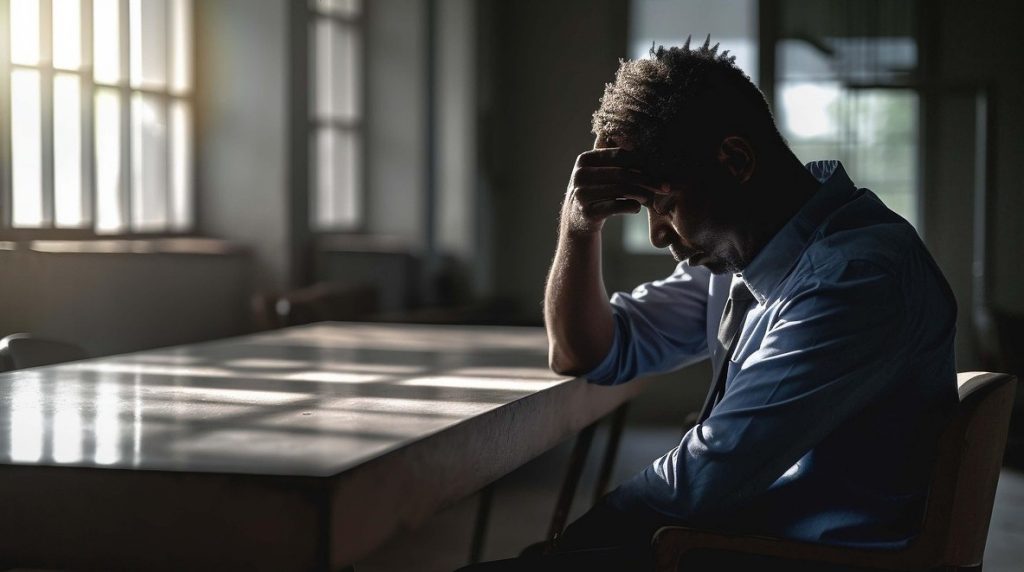Mental Illness and The Criminal Justice System
Prosecutors and judges are often unfamiliar with mental illness and may misjudge an ill person charged in criminal court. To effectively represent a client with mental health issues, an attorney must understand the challenges such a client would face.

Mental Health Challenges Can Mitigate in Favor of Someone Charged with a Felony or Misdemeanor
Mental health challenges are increasingly recognized as significant factors in many criminal cases, and defense lawyers often use them to mitigate in favor of favorable plea bargains and lenient sentences. The fundamental argument here is that individuals with mental health conditions might not possess the same level of culpability as those without such conditions. For example, someone with mental illness facing criminal charges might not fully understand the implications of their actions, effectively control their impulses, or even differentiate between right and wrong.
The presence of a mental disorder can sometimes explain why an individual committed a crime, suggesting that the act might not have been committed had they been in a sound mental state. Courts and society are slowly acknowledging that punishment may not always be the most appropriate or effective response for these individuals. Instead, rehabilitation, treatment, and support can be more beneficial, not only for the accused but also for society. Thus, in presenting evidence of a client’s mental health issues, defense lawyers aim to humanize their client, contextualizing their actions within the framework of an illness that often requires compassionate intervention rather than purely punitive measures.
The Connection Between Mental Health Issues and Criminal Justice
Mental illness is one of the leading causes of poverty, crime, and homelessness in the United States. According to the National Alliance of Mental Illness, 1 in 4 adult Americans has some diagnosable mental illness. Further, 1 in 17 live with a serious mental illness such as schizophrenia, major depression, or bipolar disorder. About 9.2 million adults have mental health and other disorders. Approximately 20 percent of state prisoners and 21 percent of local jail prisoners have a recent history of mental illness. Lastly, 70 percent of youth in the juvenile justice system have at least one mental health condition, and at least 20 percent live with a severe mental illness. Serious mental illness costs the United States $193.2 billion in lost earnings annually. These statistics regarding mental illness and criminal charges are shocking.
If you, or someone you know, have a mental illness, you know the pain and suffering it causes. You also understand how mental illness can result in behavior leading to contact with the criminal justice system and felony or misdemeanor charges. You only need to visit a courtroom on a criminal docket day to see the prevalence of mental illness.

Minor Mental Health Issues and The Impact on Criminal Charges and Defense
Anxiety, extreme stress, and depression are mental health conditions that can inadvertently contribute to criminality in various ways. Individuals suffering from severe anxiety may engage in substance abuse to self-medicate and alleviate their symptoms, leading to crimes related to drug possession or Operating While Intoxicated (OWI). Extreme stress, especially if prolonged, can impair judgment, reduce impulse control, and lead to aggressive behaviors. Depression, stress, and anxiety, marked by feelings of hopelessness and despair, might push some individuals towards theft (retail fraud or shoplifting), fraud (larceny or embezzlement), or substance use (illegal drugs or prescription medication abuse) as a way to cope or find temporary relief. It’s important to understand that while these mental health conditions can be factors in criminal behavior, they do not inherently predispose someone to commit crimes. Most people suffering from mental health issues are not criminals; they just need someone to understand and help them.
Criminal defense lawyers representing clients with these conditions must humanize their clients and present a comprehensive understanding of their mental state. By demonstrating the influence of these conditions on their client’s behavior and decisions, lawyers can make a compelling case for rehabilitation and therapy over incarceration. Judges and prosecutors might be more amenable to plea bargains or lenient sentences if they understand that the defendant’s actions were influenced by mental health issues that are under treatment. By negotiating such deals, top defense attorneys, like the ones with LEWIS & DICKSTEIN, P.L.L.C., can ensure that their clients receive the necessary medical and psychological care, aiming for a holistic approach to justice that prioritizes recovery over purely punitive measures.
Major Mental Illness and The Impact on Criminal Charges and Defense
Many severe mental illnesses can increase an individual’s likelihood of interacting with the criminal justice system. Some of the most common mental health disorders among criminal defendants include:
- Schizophrenia and Other Psychotic Disorders: People with untreated psychotic conditions might experience hallucinations, delusions, and disordered thinking. The struggle with discerning what stimulus is real can lead to unpredictable or aggressive behavior or actions that are perceived as criminal. For instance, someone might break into a house believing it to be their own due to a delusion.
- Bipolar Disorder: Characterized by alternating episodes of mania and depression, individuals in manic phases may exhibit risk-taking behavior, aggression, or impulsivity. This mental illness causes unusual shifts in a person’s mood, energy, activity levels, and concentration.
- Major Depressive Disorder: In severe cases, those suffering from depression may resort to illegal drugs or alcohol to self-medicate or engage in theft or other crimes due to hopelessness or desperation. Sometimes, people suffering from severe depression can act out or engage in illegal behavior due to aggression, grief, or despair.
- Substance Use Disorders: Substance abuse and addiction significantly contribute to criminal activity. The addiction can drive individuals to commit crimes to sustain their habit, like theft or dealing. Furthermore, being under the influence can impair judgment, leading to offenses such as assault or OWIs. Historically, judges and prosecutors have little sympathy for those suffering from alcohol or drug addiction. A skilled defense lawyer must persuade the harshest judges that rehabilitation is a better option than punishment.
- Personality Disorders: Especially disorders like antisocial personality disorder, which is characterized by a long-term pattern of manipulating, exploiting, or violating the rights of others. Such individuals may repeatedly get involved in criminal activities. At LEWIS & DICKSTEIN, P.L.L.C., we often see individuals suffering from personality disorders changed with resisting the police, assault, and malicious destruction of property.
- Post-Traumatic Stress Disorder (PTSD): Individuals with PTSD, especially if untreated, might engage in substance abuse, aggressive behaviors, or other actions leading to encounters with the criminal justice system. Fortunately, judges and prosecutors have become more familiar with PTSD and amenable to favorable resolutions when convinced the defendant is getting meaningful help.
- Attention-Deficit/Hyperactivity Disorder (ADHD): Individuals with ADHD may act impulsively, sometimes resulting in unlawful activities. Common crimes associated with ADHD include retail fraud, driving under the influence of prescription medication (OWPD), and domestic violence.
- Traumatic Brain Injury (TBI): TBIs can lead to cognitive impairments, reduced impulse control, and behavioral changes that increase the risk of criminal behavior. The Defense Team with LEWIS & DICKSTEIN, P.L.L.C. has successfully represented hundreds of clients with TBI conditions over the past decades.
The relationship between mental illness and crime is complex. It’s crucial to note that most people with mental illnesses never become embroiled in the criminal justice system. However, systemic issues such as a lack of adequate mental health care, societal stigma, homelessness, and substance abuse can exacerbate vulnerabilities for some individuals, increasing their likelihood of ending up in the criminal justice system. It is the top priority of LEWIS & DICKSTEIN, P.L.L.C. to credibly and convincingly demonstrate to prosecutors and judges that intervention and treatment can be more effective than incarceration in addressing the root causes of the behavior and ensuring the safety of the community.

Mental Illness, Competency Evaluations, and Criminal Responsibility
Michigan Law requires a person to be “competent” to stand trial on felony or misdemeanor charges. Competency means the person understands the nature or purpose of the proceedings against them and can assist their attorney in their defense. If a lawyer or the judge calls a severe mental health condition into question, a knowledgeable and experienced attorney will request a forensic competency evaluation. Forensic evaluations are tools attorneys and judges use to protect a defendant’s rights in court.
After the judge orders a competency evaluation, the Center for Forensic Psychology, a Michigan Department of Health and Human Services division, will schedule the defendant for an interview with a psychologist. After the interview, the psychologist will author a report and recommendation. The judge, prosecutor, defense attorney, and defendant will have access to the report. The forensic psychologist might recommend (1) the individual is competent to stand trial; (2) not competent to stand trial but could regain competency through treatment; (3) is not competent to stand trial and unlikely to regain competency. Any treatment may not exceed 15 months or 1/3 of the maximum sentence the defendant could receive if convicted of the charges against him, whichever is lesser.
Competency Evaluations are available for misdemeanor and felony crimes. The defense lawyer can request a competency referral at the district and circuit court levels. However, a criminal responsibility evaluation for the insanity defense is only available for felonies at the circuit court level. A defense lawyer can request a criminal responsibility evaluation even if the judge determines the defendant is competent to stand trial. Understanding these options and using these tools effectively in a person’s defense requires a dedicated and savvy attorney. The legal team at LEWIS & DICKSTEIN, P.L.L.C. is experienced and prepared to assist individuals through these options and the nature of the charges against them.

Michigan criminal lawyers who can defend clients with mental illness
A person facing a criminal charge and dealing with a mental illness, including but not limited to schizophrenia, bipolar disorder, Alzheimer’s Disease, or dementia, needs a compassionate attorney who understands the pain and anxiety that both situations cause. Michigan criminal lawyers need to be experienced in handling the defense of the criminal charge and making sure that mental illness is appropriately considered.
The attorneys at LEWIS & DICKSTEIN, P.L.L.C. have extensive experience in these situations. Our attorneys have access to the necessary experts and materials to provide the best possible defense for clients with mental illness. We have the compassion and understanding to protect a person with a mental illness, while being aggressive and tenacious in protecting them from a criminal charge. It is essential to have both compassion and toughness. Our attorneys have the respect, reputation, and decades of experience to handle your matter. Our firm is the “go-to” Michigan criminal firm if you or a loved one is in trouble. Call us for a free consultation today. We will find a way to help you!
Call us today at (248) 263-6800 for a free consultation or complete an online Request for Assistance Form. We will contact you promptly and find a way to help you.














